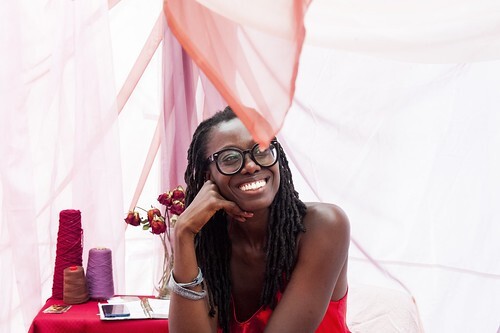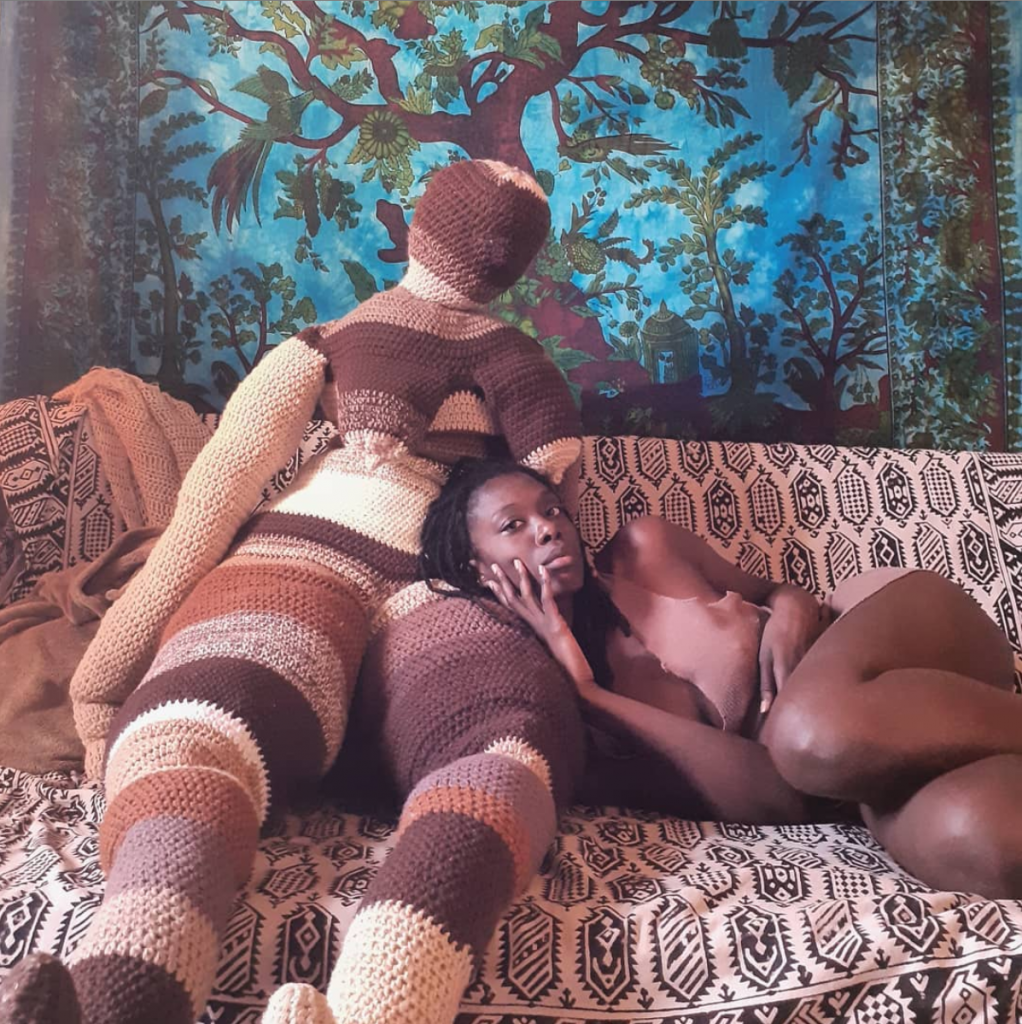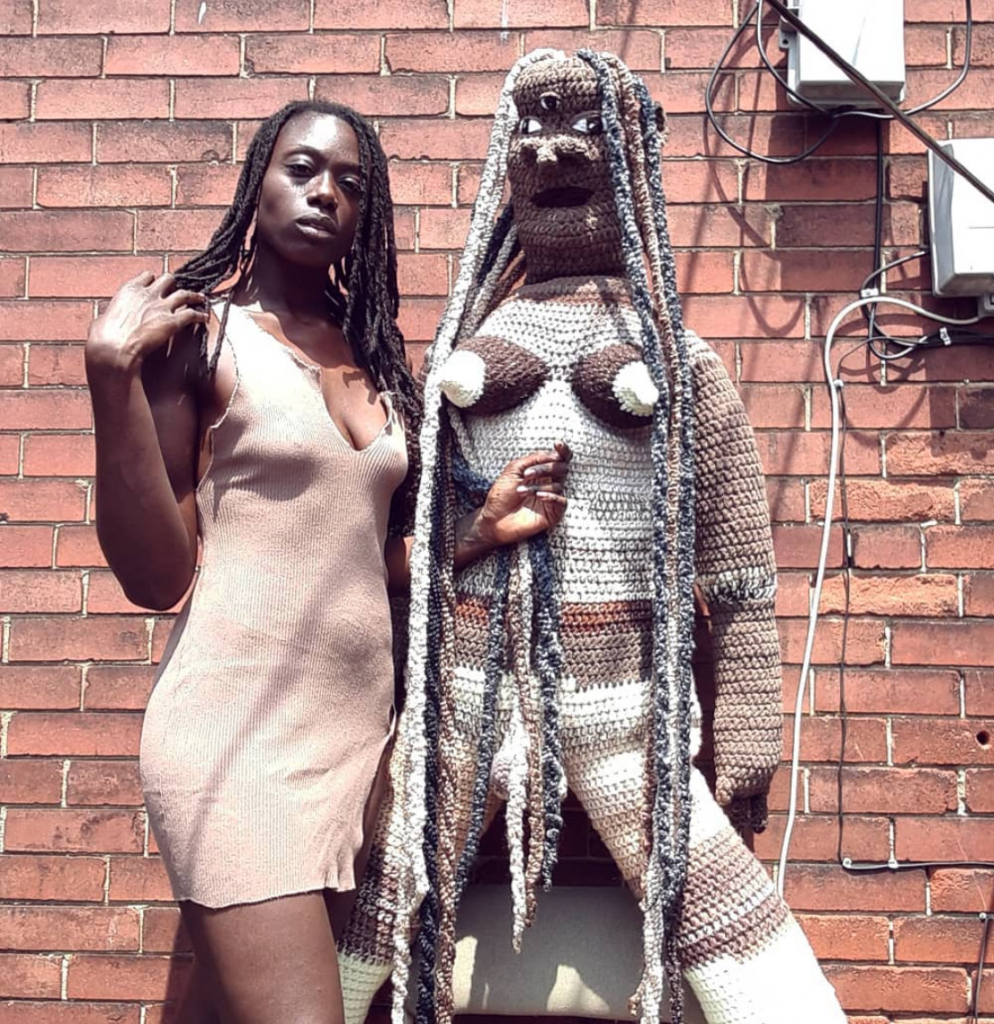Chason Yeboah brings life and love to her "anatomically correct" dolls
By Nia Centre, p
Posted on June 25, 2020
A conversation about queerness, body positivity, crochet dolls, and next steps with Toronto-based crochet artist Chason Yeboah

Conversations about body positivity have transformed tremendously in the last decade, and Chason Yeboah has been creating space for queer bodies—specifically Black queer bodies—to be part of the discussion. Yeboah, a queer Afro-diasporic artist based in Toronto, has brought a soft, comforting voice to the fight for body positivity with her “anatomically correct” crochet dolls.
“I just want to make sure people feel acknowledged and understand that their existence is extremely important,” said the young artist who has been crocheting since she was a teenager.
Yeboah’s nude dolls represent all shapes, sizes, and identities; some dolls have vitiligo, dark skin, amputees, vasectomies and are transgender. They are “anatomically correct,” as she calls it, and represents the beautiful journey our bodies go through as we venture on self-discovery.
With every order, she asks the customer to fill out a questionnaire so she can better understand the person she’s creating the doll for. Some of the questions ask what the individual loves most about their body, what colour their areola is and general character traits.
“These are things I want to know about the people I'm making so that when I'm creating it, I can put important intentions into the doll for you. So that when you take it home, it's a real and true healing tool. You can use [the doll] as a totem to just revere yourself, and completely honour yourself and your body, and what your body does for you.”
These dolls bring light to the bodies we don’t see in art and let alone in mainstream conversations about body positivity. Her first doll ever created was a trans woman with large breasts and a penis.

“I was like, alright, this makes sense to me,” she said, “I want people to know, we as marginalized people, people with disabilities, people with different bodies, people who are just looked at differently in contrast to societal norms, you are very important,” she said.
Most recently, Yeboah’s dolls were used for a music video for “Reach the Sky” by Queer Songbook Orchestra. In this stop motion video, the characters are on a journey of self-discovery by finding love and acceptance for their queerness. The characters were represented as Yeboah’s anatomically correct dolls. The choir took this video with them on tour to play for high school kids in small towns across Canada.
“That was the most heartwarming, awesome thing. It made me so so happy. I know I definitely want to make more films, because it's the best way to get it to everybody, and make it accessible to everyone,” she said.
Yeboah started crocheting as a means of necessity. She made her own scarves, sweaters and other winter essentials that she couldn’t otherwise afford.
Somewhere down the line, Yeboah saw this medium as a way to fill the gaps in the representation of Black bodies. As a daycare worker in her apartment building, she noticed a lot of Black girls would play with white dolls, and so she made these Afro-inspired “Kente Sisters”
“I had a few Black dolls but they had very eurocentric features and something in me was like no, I'm going to make these dolls for these girls, but they were also for me as well,” she said.
Crochet doll-making has become a healing tool for Yeboah, and a way to honour her female lineage. As a Ghanian-Trinidadian artist, she sees her identity inherently tangled within the Afro-diaspora which has become part of her intention as she creates.

Right now, Yeboah is weaving a life-sized woman that changes into many different things as she’s being created. The changes have to do with nature and identity, and Yeboah says she reflects on her ancestors as she creates this piece, and sees herself as a vessel for their stories and skills.
“When I weave these pieces together, I'm weaving a story of my parents' travels, of my ancestors' travels, and bringing a piece of myself into it—which brings a more modern touch,” she said.
Yeboah is working to expand her skills into other mediums like filmmaking. She’s collaborating on a project with James Yeboah that touches on the stigma of mental health for Black men. She’ll be creating an installation that’ll be a “safe space” for all interviewees to talk about the emotions they never felt comfortable with expressing before.
She also started making crochet tops and handing out free titty-shaped crochet stress balls for Black people in need of comfort during these challenging times. You can follow her and her work here.
Copyright © 2026 Nia Centre for the Arts All Right Reserved.